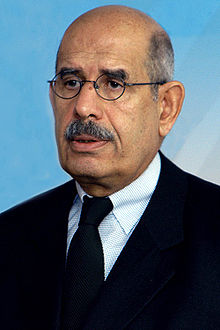The former head of the International Atomic Energy Agency is more worried about a terrorist group getting its hands on a nuclear weapon than a nation such as Iran obtaining and using one, reports David Proeber writing for The Pantagraph.
Also, Mohamed ElBaradei, who along with the IAEA was awarded the 2005 Nobel Peace Prize, told the audience at Illinois State University’s Center for the Performing Arts on September 28 it was imperative that states with nuclear weapons divest themselves of those weapons.
“It borders on insanity that we still have 16,000 nuclear weapons,” ElBaradei said, referring to the world’s stockpile of what he called weapons of the Cold War.
Delivering the annual Adlai E. Stevenson Memorial Lecture, ElBaradei said, “Reliance on nuclear weapons … is increasingly hazardous and decreasingly effective.”
ElBaradei was also reported saying the frustration and loss of hope that results from assaults on human dignity breeds violence and extremism, as seen in terrorism today. He asked just what is the international community doing and what has it done, little more than wringing its hands while millions have died, quoting Rwanda and Darfur.
He asks to break this vicious cycle and one way is to form global a social contract based on mutual respect and dialogue.
By their very nature, these threats require global cooperation, he insists, but structural deficiencies and lack of resources have caused international institutions to become polarized and paralyzed.
ElBaradei also highlighted the “obscene levels” of inequality in wealth, calling poverty “the most lethal weapon of mass destruction,” adding that a stable society needs to have not only political freedom, but also economic and social freedom.
In answer to a question about how to deal with brutal dictators, ElBaradei said, “There’s no one-size-fits-all” answer.
“You need to have zero tolerance for repression, but you have to have a plan for the day after,” ElBaradei said, pointing to the chaos that has followed the toppling of Saddam Hussein in Iraq and Muammar Gaddafi in Libya. “Gaddhafi was a crazy dictator,” ElBaradei said, but he then asked if Libya is better off totally disintegrating.
“Compassion and, above all, human solidarity should be our compass,” said ElBaradei.
He expressed support for the recent nuclear agreement with Iran, saying 10 years were wasted because the United States initially refused to negotiate or compromise.
“It takes courage to make compromises,” he said. “You can’t get your way 100 percent.”
To see the article in its original form go to: www.pantagraph.com






